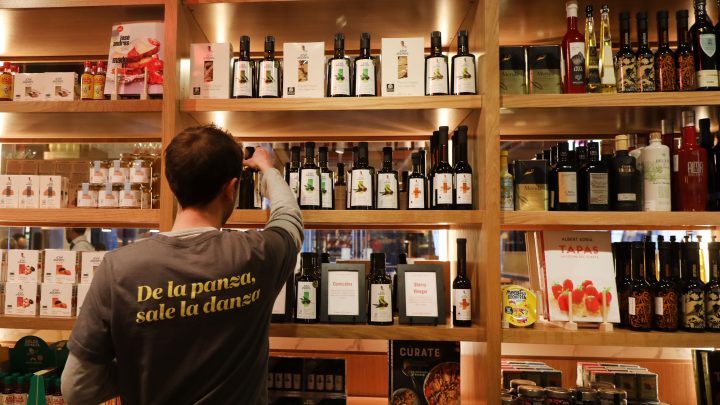
Why are boutiques and coffee shops selling the same olive oil and tinned fish?
Why are boutiques and coffee shops selling the same olive oil and tinned fish?

Many local independent stores these days sell pantry goods — think olive oil, spices, maybe tinned fish. Writer and director Emily Sundberg noticed many of these boutiques were selling the same brands and goods she’d seen on Instagram, and she dug into the trend for New York Magazine’s Grub Street.
Sundberg told “Marketplace” host Kai Ryssdal that online wholesaler Faire “was sort of like the Oz behind the curtain of how all of these brands are having the same retail setup.” The following is an edited transcript of their conversation.
Kai Ryssdal: Tell me how this piece came to be.
Emily Sundberg: Sure. So I’ve worked in multiple different business settings over the past few years, and I started noticing this same retail setup, kind of copy and pasted, whether it was in a wine store, or a coffee shop, or a bookstore. And it was the same three or four brands that I was used to seeing pretty much constantly on Instagram over the past few years. And I started to investigate why these same four or five brands were everywhere.
Ryssdal: Before we get to the to the payout of what your research told you, what were the brands? What were you seeing, like, literally on the shelves?
Sundberg: Yeah, I was observing mostly food brands. So there was Graza olive oil, which I wrote about. There’s a tinned fish brand called Fishwife. They’re all pantry basics that we’ve seen our whole life. Nothing’s new, nothing’s invented. But it’s just the packaging is sexier, and they all have these really big founder stories that have been heavily marketed over the past few years.
Ryssdal: You mentioned this, and I just want to pick up on this: This sounds very Instagram-friendly, millennial-y — sort of going to that demographic. Is that fair?
Sundberg: Yeah, most of these brands started as direct-to-consumer, Instagram-focused brands that exploded over the pandemic, because the pendulum had shifted heavily to home cooking and people really embracing their kitchens. So it was like a really hot market for founders and investors.
Ryssdal: So now let me get to the gears behind this, because you also talk about an online marketplace called Faire. And I want you to No. 1, explain what it is, and No. 2, explain how it applies to these sorts of brands and goods showing up in these boutiquey coffee shops in Brooklyn.
Sundberg: So Faire is a wholesale marketplace. So traditionally, if you were a store and you wanted to fill your store with interesting brands, you’d spend money to go to a trade show, meet vendors, form relationships with them and a few months later get their stuff in your store. But Faire, which was started a few years ago — it’s now considered a decacorn, I think they were recently valued at something like $12 billion — is essentially like the Amazon of wholesale. So you can just go on as a store, find these hot brands that you see online and place a bulk order for them. And they carry brands of all different sizes. So maybe you’re a coffee shop that wants to carry the same stuff that Whole Foods has, but you don’t need to have a direct relationship with that brand anymore. You can just go on Faire and have it done extremely quickly and efficiently. And yeah, that was sort of like the Oz behind the curtain of how all of these brands are having the same retail setup.
Ryssdal: And that’s great, right? Because you want small businesses to have the same opportunity to get products as Whole Foods. But it does kind of give lie to the whole, “Oh, this is just a tiny little sort of boutiquey thing going on here.”
Sundberg: Yeah, and I think most people, if they spend the time to look into the brands that they’re purchasing from, most of these fundraising records are public. And again, I’m not bashing fundraising, I just think that putting your products next to actual small businesses can be a little bit confusing for the consumer. And then the other side of this is just the rise of this new general store, and how all specialty stores look the same now, so none of them are actually really that special.
There’s a lot happening in the world. Through it all, Marketplace is here for you.
You rely on Marketplace to break down the world’s events and tell you how it affects you in a fact-based, approachable way. We rely on your financial support to keep making that possible.
Your donation today powers the independent journalism that you rely on. For just $5/month, you can help sustain Marketplace so we can keep reporting on the things that matter to you.

















